 Judge, Pre-judge people? Pre-judging is a cognitive bias… how to avoid making stupid value judgments…
Judge, Pre-judge people? Pre-judging is a cognitive bias… how to avoid making stupid value judgments…
Our prejudices often rob us from seeing what is in front of us.
Prejudice is a simple two-part word: pre-judge. Meaning: judge from some simple criteria, like the color of someone’s skin, the strength of their grammar, their clothing, or whether they curse or not.
And then we stop looking, because the judgment is already there: this or that.
Pre-judging is a cognitive bias, it is the mind’s attempt to save you time. It is accurate for our purposes of survival, about 60% of the time. 40% of the time it is inaccurate, and leads to stupid, self-defeating decisions.
Most people get married based on a the 40%, hire people, buy stuff, or not buy, reject perfectly good matches.
Cognitive biases 1 are all from the Tree of Knowledge, highly manipulable… and is highly manipulated.
Because cognitive biases all act underneath the level where reason is.
Reason is a type of intelligence that depends on intellect, education, and clarity.
Pre-judging is normal. Being stuck there is commonplace and not normal…
If you find yourself stupid… or with cream on your face… you need to learn about cognitive biases and learn how to live consciously… even though the cognitive biases are difficult to avoid…
If you don’t know that you are pre-judging (or any of the other cognitive biases), then you can’t change your behavior.
You can’t change what you can’t see. And you can’t change what you don’t own.
Ownership is a special relationship to things, to life.
In ownership you put yourself in position to have power over the things, over life. Like an owner of a business.
I remember when I first played with this distinction. It came through a course, The Communication Course, where “they” taught that “Life is a conversation”…
WTF, right? But that was the statement we needed to prove, if we wanted to have access to power, access to change things, access to a life worth living.
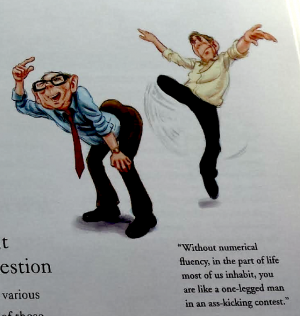 The example they used was marriage. They said: marriage is a conversation. It is not the paper you signed. It is a type of conversation that has survived many hundred years, and as long as we consider two people joined by the hip because they signed that paper, they are actually supposed to behave according to some societal tradition.
The example they used was marriage. They said: marriage is a conversation. It is not the paper you signed. It is a type of conversation that has survived many hundred years, and as long as we consider two people joined by the hip because they signed that paper, they are actually supposed to behave according to some societal tradition.
But mostly the paper, the marriage license, is about money and about the children.
I don’t want to get stuck in the marriage conversation, even though it is very attractive… much like a black hole.
I want to share with you my first foray into the invented conversation: ownership.
 I was working as an architect for hire at the time, 1987… in New York City.
I was working as an architect for hire at the time, 1987… in New York City.
On Monday, after the course, I went to work, and I was going to test this “Life is a conversation” thing.
If it is true, then I can be the owner of that small design firm without having the papers say I was.
The promise of “Life is a conversation” and by the same power “ownership is a conversation” was: seeing the world differently.
So I opened the door, took my jacket off… went to get coffee, and noticed the unwashed coffee cups in the sink. Then I noticed that the secretary was on the phone: a personal call. Then I noticed litter on the carpet. Then I noticed that other employees worked only on and off… mostly off.
I saw them working for me, and I saw that I paid them to slack off. I noticed that my pocket book was hurting. I don’t remember what I said, but I probably expressed my displeasure. I noticed that people started to work when I looked at them. Like little kids…
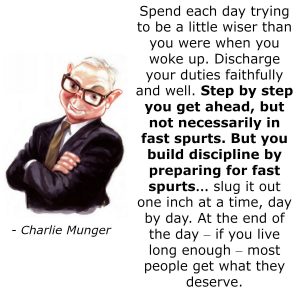 Tuesday afternoon the owners, two women, called me to their office. They thanked me…
Tuesday afternoon the owners, two women, called me to their office. They thanked me…
A month later work dried up… we were just after the stock market crash. But given my “performance”, these two women kept me alive as long as I wanted to be kept alive… every time they needed an architect to help out, they always called me. For months that was my only income… All because of that “ownership is a conversation” bit.
OK, back to the original topic: pre-judging.
When you can own that you pre-judge… automatic, so you can’t avoid it… then you can suspend the judgment until you get more information. Until you look more, see more.
All cognitive biases can be kept from destroying or damaging your life by this simple solution: own it and suspend it until you can make your final judgment call.
Yesterday I saw that in action.
In the Community Center, there are regularly scheduled rides to the grocery store, to Walmart, etc.
All of us are over 60 years old, car-less, and live alone.
People look at one another through the judgment: “oh, you need a ride too? You must be stupid like me, etc.”
And whatever you say is heard through that prejudice: “you are just a windbag… like me.”
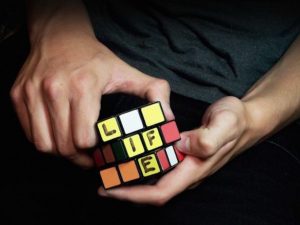 Yesterday, sitting around a table at the coffee shop at the grocery store, the topic of IQ came up. The guy next to me was saying something about his own IQ, and I made the strategic mistake of saying something intelligent and not Tree of Knowledge stuff about IQ… and he immediately called me names… I stood up and left the table.
Yesterday, sitting around a table at the coffee shop at the grocery store, the topic of IQ came up. The guy next to me was saying something about his own IQ, and I made the strategic mistake of saying something intelligent and not Tree of Knowledge stuff about IQ… and he immediately called me names… I stood up and left the table.
I have nothing to prove, nothing to defend. Tai said: I was with the 33% that had a vibration, an IQ, knowledge, etc. below mine. I don’t need to bathe in dirty water… Judgmental? Hell yeah.
I have visitors on my site who “shoot from the hip”… speak without reading, speak without looking first. They already know what kind of person I am. And they write a comment to tell me off.
You probably judge me while you want to learn what I know without having to learn from me. I don’t fit your image of a teacher, but you need the knowledge.
Or, you want to learn from me, but you judge yourself smarter than me, and therefore everything I say evaporates into thin air… you don’t learn anything.
Or you see me as something special, and you don’t even listen to what I am saying… you hear “special, blah blah blah blah blah”. No echo. You never heard what i said.
Einstein was lucky that his Theory of Relativity came out and was accepted while he was young.
Why? had it come out in his later years, when obviously he knew more, he would have been rejected. Why? Because he was so occupied with his work that he got out of the bath without washing, and didn’t have a hair cut too often… So he looked like a hobo, and smelled worse.
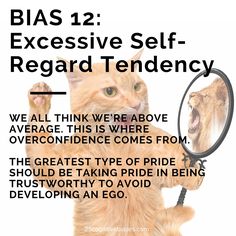 You feel like you are more than me, so why should you listen to me. You have a regular paycheck, you own your own house, and you drive your own car… obviously you know more… after all I rent, I don’t have a car… why learn from a pauper.
You feel like you are more than me, so why should you listen to me. You have a regular paycheck, you own your own house, and you drive your own car… obviously you know more… after all I rent, I don’t have a car… why learn from a pauper.
I had a friend I spoke with once a week, saved his job, saved his marriage, saved him from making many wrong moves… But after 14 years of being friends one day he blurted out that his “conversation” about me was that I was destitute.
I terminated our friendship then and there.
Your “conversation” about anything, is a filter. A prejudice. It either allows you to benefit from it, or you lose out.
People, you, are duped into never examining your filters. 2
Mother Teresa did not actually do anything good for the poor. He was a Catholic Church “employee” who shrewdly took advantage of every drop of misery to increase the number of Catholics in the world. Just look again… and question your prejudice of the “saint”.
Mahatma Gandhi was known as a saint, of non-violence, but in his life he was violent, he practiced violence. Check your prejudices, please.
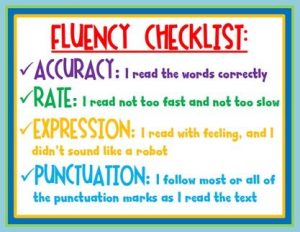 Own that your filter is a Tree of Knowledge mechanism to get you through life without actually getting any information through your senses, or doing any thinking.
Own that your filter is a Tree of Knowledge mechanism to get you through life without actually getting any information through your senses, or doing any thinking.
Own that you complain that you hate your life. That you are depressed. That you don’t feel yourself, you don’t have yourself, that you feel miserable.
Start where you are… and get off the Tree of Knowledge.
Or stay there but shut up. Now it is a choice to be miserable. Your choice. Own it.
PS: I have a history of weird cognitive biases.
The most disturbing of them is this: I meet someone for the first time. I judge them… where the judgment comes from: I don’t know. In my self-awareness, I pay attention. But on the Tree of Knowledge I am attracted or repelled by the person.
Give it another week, maybe a month, and I will flip my opinion over… for about a month, rarely longer. And I will return to the original judgment.
Why is this happening?
It seems to me that I pay close attention to the person when I first meet them. Then I distrust my judgment, I criticize myself for being harsh… and force myself to pay attention to what is good about the person.
But eventually the good is overwhelmed by the bad… like the end of the honeymoon period, and the real personality of the person comes out.
This flipping back and forth has caused me a lot of grief. So what did I do to reduce the grief?
I have been suspending judgment… or if it is impossible: I have been allowing a lot of time to pass before I do anything consistent with any judgment. This includes buying stuff.
Whenever I don’t do that, I wasted my money. Why? Because the presenter’s personality, his real intention make it impossible for me to benefit from their teaching.
As an empath I can’t be fooled. When someone says: they hate salesy stuff… that is intended to fool you. But it is salesy… and that is the bottom line.
Only allowing the real personality of the presenter time to show up is a good solution for me.
And when it comes to students: I have found that I don’t need to like you to teach you. It helps, but it is not necessary.
And, between you and me, you are not very likable… lol. If you were, you would not be here. You don’t like yourself, and it is well-deserved dislike. You don’t do the things that work, and you do the things that don’t.
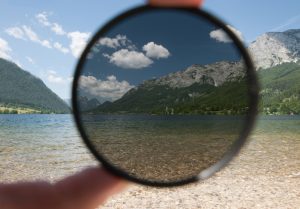 You hate, you get angry, you judge, you resist… how could you like yourself… you are cutting your nose in spite of your face.
You hate, you get angry, you judge, you resist… how could you like yourself… you are cutting your nose in spite of your face.
Almost all of you. So in teaching, I have found, being able to serve you, being able to guide you, or at least attempt to do so, is the only thing that makes me and our relationship independent of the prejudice… that is unavoidable.
- A cognitive bias is a click-and-whirr response to a trigger, without involving reason, or even looking, to make a decision to make a move… 26 cognitive biases are listed here: –> https://en.wikipedia.org/wiki/List_of_cognitive_biases
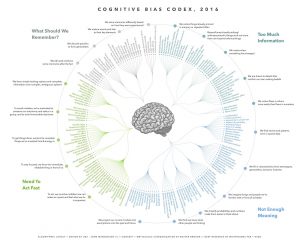
- Some of the best work I do with people is revealing their filters… then they can own the filter and manage it.
